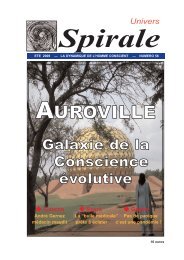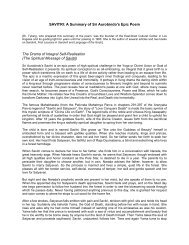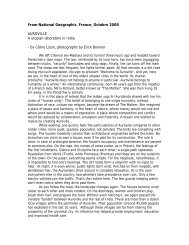Invocation 08 - Auroville
Invocation 08 - Auroville
Invocation 08 - Auroville
Create successful ePaper yourself
Turn your PDF publications into a flip-book with our unique Google optimized e-Paper software.
e formed to justify this picture. How do you otherwise explain to seekers<br />
what is this grotesque, this fantastic composition?<br />
Now this is how myths sometimes hide in seed form within them a profound<br />
revelation of consciousness. Needless to say, they have nothing to do with<br />
happenings in the gross physical world. There is another kind of myth which<br />
has for its contour gross physical events which did take place along the<br />
annals of time-bound history, but in this case there is always a very close<br />
intermixture of what happened on the surface and what happened within.That<br />
is to say, such stories are allegoricaI, wholly or partly. I will give you another<br />
example, and here we come very close to our topic, the quest for immortality,<br />
the revolt against the phenomenon of abrupt, brusque and arbitrary<br />
interference of what is called death into our life as human beings.<br />
I am sure you all know the story of Nachiketas, a boy who is a witness to<br />
his father's performance of a yajna, or fire rite. This is a particular kind of<br />
sacrifice by which one gets rid of all one's attachments, by giving things<br />
away. Through the medium of the physical symbol of aspiration that is fire<br />
one is really offering one's attachments one after another, each represented<br />
by some physical object. The rishi in question is getting rid of all his<br />
possessions, he is giving away everything he has. While performing the<br />
yajna he is making a donation of all that he has to other people, to people in<br />
need and to other rishis. And his young son sees all this. In this myth, the<br />
surface story and the inner truth run parallel. The little boy thinks, "My<br />
father is also very much attached to me, and once this auspicious moment of<br />
yajna passes, if he has not got over his attachment to me, he will not be<br />
completing the very function of his yajna." So quietly the boy comes closer<br />
to his father and says, "To whom did you give me away?" - as if to remind<br />
him that he ought not to forget to dedicate him to a right master. The father,<br />
the Katha Upanishad tells us, says, "Oh, I give you to Yama."<br />
That is what the story tells us on the surface. And, we are told, Nachiketas<br />
quietly walks to the abode of Yama, the God of Death. The god is not at<br />
home. For three days and three nights Nachiketas waits for the return of the<br />
god of Death. When he comes, the god is so pleased with this little boy's<br />
patience and perseverance that he offers him three boons in lieu of his three<br />
days of endurance. The first boon the boy asks is, "Let my father feel complete<br />
peace and happiness in his heart, because he has given his dearest object,<br />
that is myself, his son, to you. Nothing should remain in his heart to give him<br />
20
















